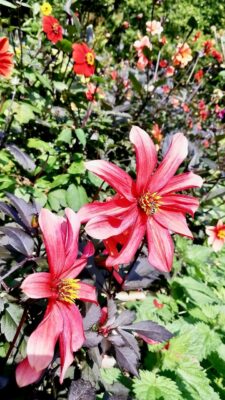As the stakes rise for our natural world, it’s time to harness the collective potential of our gardens and greenhouses as a force for good.
Our life support is on the blink. This prospect would be scary enough if it were happening in one of our hospitals, but what elevates it to terrifying status is that the global support systems that sustain all of life on earth – the living nature that’s all around us – isn’t just blinking, it’s flashing red.
We hear more and more about ‘tipping points’ in the news. Scientists, primarily those in the climatic field, together with those studying earth’s interconnected ecological systems, are furiously waving red flags as we push our living world to its limits.
In a nutshell, a tipping point is when a small change makes a big difference to an entire system, which itself is a group of things that relate to and interact with each other. Change following a tipping point might be abrupt, self-perpetuating and irreversible (it can also be non-abrupt and reversible). We can think of our climate as now reaching certain tipping points – due to us adding more carbon dioxide and other greenhouse gases to our atmosphere – resulting in global changes expressed most starkly as extreme, record-breaking, increasingly frequent and often deadly weather events.

Scientists tell us that our climate system is moving to a new, hyperactive state, leaving behind the relatively benign one that recent human civilisation has flourished – and gardened – under; the planet we thought we were living on is altering before our eyes. As our world shifts and judders around us, it’s surely time for gardening – with its renewable power to enrich, heal nature, feed us and make everyday life beautiful – to reach a positive, unstoppable tipping point of its own.
For that to happen, gardening must first step out from the environmental shadows and flex its horticultural muscles. Growing stuff at home has for too long been seen as only a bit of fun; it’s just gardening, after all – it doesn’t really have anything to do with environmental issues, does it? After all, it’s only about growing flowers, and perhaps some stuff to eat.
Yes, we can stop using peat-based compost, ditch pesticides and forgo plastic – all of this is crucial – but on the bigger environmental concerns, there’s not much that gardening – and we gardeners – can do.
Or is there?
For gardening to bloom as a force for good in our world – one that is to be reckoned with – it must shed its just-a-bit-of-fun image and grow some green gravitas. It must become a serious contender in discussions around how we arrest the decline of nature and help to restore it, both near and far. It must be taken far more seriously by our fickle mainstream media; we don’t need the patronising, condescending and glib tone that accompanies any mention of gardening on the television and radio. It needs to be recognised as the one planet-fixing activity that’s accessible to us all, wherever we live and however we garden, whether that’s in a window box or in a full-size garden or allotment.

None of this – in case you are panicking – means that gardening will be any less fun or enjoyable; upping gardening’s eco-ante will give it an edge that propels us into having more purposeful fun than we’ve ever had before. In a fast-changing world, gardening’s path leads us beyond despair and powerlessness, because it’s all about doing stuff, about reconnecting with and being in and part of nature. Eco-warriors in wellies? We’ve got the flower power!
We’ll know for sure when gardening reaches its own tipping point, because the system in which it operates will begin to change. A clear sign of that change will be when gardening is treated as not just highly profitable by retailers (profits often derived from pointless, ephemeral tat that does nothing to enhance our world), but as a people-powered, priceless ecological activity; citizen gardening has a promising ring to it. As new, future-savvy, locally focused and not-for-profit businesses germinate, dust will quickly gather on fading plastic meerkats.
Greenhouse gardeners are already in the vanguard of slowing, repairing and reversing some of the harm humanity is inflicting on nature. We’re already pioneers in the low-tech use of renewable energy: our greenhouses capture and concentrate free and non-polluting modern sunshine to help bring new plant life into our world. Our treasured covered spaces shrug off rain, sleet, hail and snow, allowing us to outsmart capricious seasons, and to thwart volatile weather, giving us a home-grown edge.
We’re sowers, planters, coddlers, sharers; we’re environmental good-doers, and we number in the millions. When we all sow and grow together, we’re a mighty, fun-powered force bringing colour, food, delight, camaraderie, respite and good into often pressured lives.

Together we can pack limitless ecological oomph. We know our insect populations are under pressure and, in some instances, crashing. So imagine what a difference we could make if a clarion call went out via the citizen gardening network asking us all to grow a specific plant (or blend of plants determined by artificial intelligence) to give a helping hand to a certain species, or group, of imperilled insects (this could be replicated with at-risk birds).
Millions of greenhouses would be readied for action, waiting for spring’s clouds to part and the sun-powered show to begin. Planning, seed ordering (and sharing), sowing and nurturing would kick in, whatever the wild weather.
A community army of planting-outers, trowels sharp, would be readied, the currently greenhouse-less among its newest recruits. Prime spots would be mapped out; key areas being the edges of our towns and cities that butt up against empty, nature-depleted farmland. Days would be packed with fun, friendship, citizenry and planet-fixing purpose. With the planting done, flowers would bloom across our land. Insects in jeopardy would banquet on pollen and nectar, living on to dazzle, delight and help hold together nature’s threads for another day.
We need gardening to tip into this new, positive, earth-restoring chapter soon. It won’t be gardening quite as we’ve known it; it will be people-powered growing with passion, purpose – and fun – like never before.
Text and images © John Walker
Find John on X (formerly Twitter) @earthFgardener


